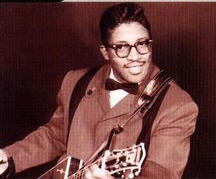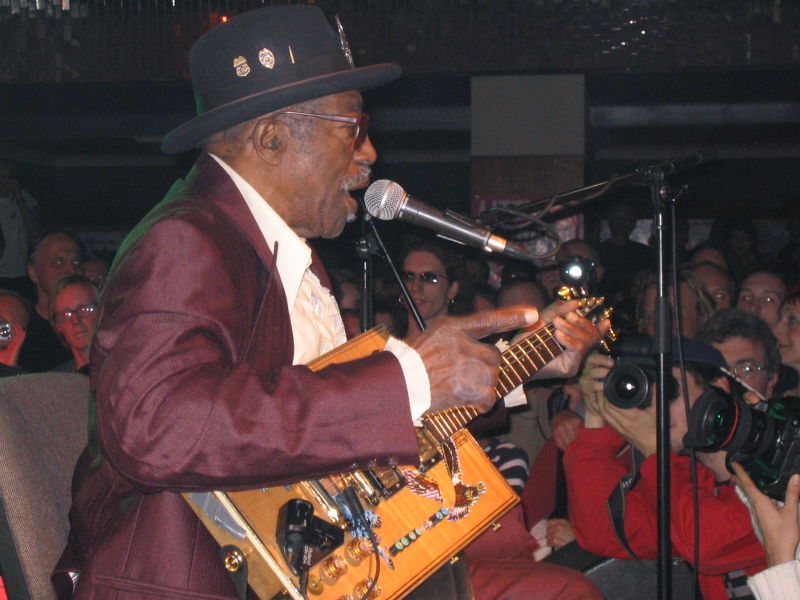He was born Ellas Bates, 28 December 1928, in McComb, Mississippi and later took the name Ellas B. McDaniel, after his adoptive mother, Gussie McDaniel. He adopted the stage name Bo Diddley, which is probably a southern black slang phrase meaning "nothing at all", as in "he ain't bo diddley". Another source says it was his nickname as a Golden Gloves boxer. The nickname is also linked to the diddley bow, a one stringed instrument used in the south by mainly black musicians in the fields.
After beginning his career as a boxer, the singer worked the blues clubs of Chicago with a repertoire influenced by Louis Jordan, John Lee Hooker and Muddy Waters. In late 1954, he teamed up with Billy Boy Arnold and recorded demos of "I'm A Man" and "Bo Diddley". Re-recorded at Chess Studios with a backing ensemble comprising Otis Spann (piano), Lester Davenport (harmonica), Frank Kirkland (drums) and Jerome Green (maracas), the a-side, "Bo Diddley", became an R&B hit in 1955.
Before long, Diddley's distorted, amplified, custom-made guitar, with its rectangular shape and pumping rhythm style became a familiar, much-imitated trademark, as did his self-referential songs with such titles as "Bo Diddley's A Gunslinger", "Diddley Daddy" and "Bo's A Lumberjack". His jive-talking routine with "Say Man" (a US Top 20 hit in 1959) continued on "Pretty Thing" and "Hey Good Lookin'", which reached the lower regions of the UK charts in 1963. By then, Diddley was regarded as something of an R&B legend and found a new lease of life courtesy of the UK beat boom.
The Pretty Things named themselves after one of his songs, while his work was covered by such artists as the Rolling Stones, the Animals, Manfred Mann, the Kinks, the Yardbirds, Downliners Sect and the Zephyrs. Diddley subsequently jammed on albums by Chuck Berry and Muddy Waters and appeared infrequently at rock festivals. His classic version of "Who Do You Love" became a staple cover for a new generation of US acts ranging from Quicksilver Messenger Service to the Doors, Tom Rush and Bob Seger, while the UK's Juicy Lucy took the song into the UK Top 20.
Like many of his generation, Diddley attempted to update his image and in the mid-70s released The Black Gladiator in the uncomfortable guise of an ageing funkster. Where It All Begins, produced by Johnny Otis (whose hit "Willie And The Hand Jive" owed much to Diddley's style), was probably the most interesting of his post-60s albums.
In 1979, Diddley toured with the Clash and in 1983 took a cameo role in the movie Trading Places. A familiar face on the revival circuit, Diddley is rightly regarded as a seminal figure in the history of rock 'n' roll. His continued appeal to younger performers was emphasized by Craig McLachlan's hit recording of "Mona" in 1990. Diddley's sound and "chunk-a-chunka-cha" rhythm continues to remain an enormous influence on pop and rock, both consciously and unconsciously.
It was announced in 1995, after many years of relative recording inactivity, that Diddley had signed for Mike Vernon's Code Blue record label; the result was A Man Amongst Men. Even with the assistance of Richie Sambora, Jimmie Vaughan, Ronnie Wood, Keith Richards, Billy Boy Arnold, Johnny "Guitar" Watson and the Shirelles, the anticipation was greater than the result.
He spent many years in New Mexico, not only as a musician, but as a law officer. He lived in Los Lunas from 1971 to 1978 while continuing his distinguished musical career. Bo Diddley served for two and a half years as Deputy Sheriff in the Valencia County Citizens' Patrol; during that time he personally purchased and donated three highway patrol pursuit cars.
He currently resides in Archer, Florida, a small farming town near Gainesville, Florida where he attends a born again Christian church with some of his children, grandchildren and great grandchildren. He continues to tour around the world, and as of the summer of 2006 was planning to record some faith-based songs, at least some of which would be utilizing his own original music.

